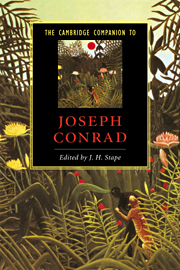3 - 'Heart of Darkness'
Published online by Cambridge University Press: 28 May 2006
Summary
Conrad's 'Heart of Darkness' is a rich, vivid, layered, paradoxical, and problematic novella or long tale; a mixture of oblique autobiography, traveller's yarn, adventure story, psychological odyssey, political satire, symbolic prose-poem, black comedy, spiritual melodrama, and sceptical meditation. It has proved to be 'ahead of its times': an exceptionally proleptic text. First published in 1899 as a serial in Blackwood's Edinburgh Magazine, it became extensively influential during subsequent decades, and reached a zenith of critical acclaim in the period 1950-75. During the final quarter of the twentieth century, however, while its influence became even more pervasive, the tale was vigorously assailed on political grounds by various feminist critics and by some left-wing and Third World commentators. In this essay, I discuss the novella's changing fortunes in 'the whirligig of time' (Feste's phrase from Twelfth Night) and argue that even now it retains some capacity to criticize its critics.
The phrase ‘ahead of its times’ first needs defence. What put it ahead of them was that it was intelligently of them: Conrad addressed issues of the day with such alert adroitness and ambiguity that he anticipated many twentieth-century preoccupations.
- Type
- Chapter
- Information
- The Cambridge Companion to Joseph Conrad , pp. 45 - 62Publisher: Cambridge University PressPrint publication year: 1996
- 6
- Cited by

